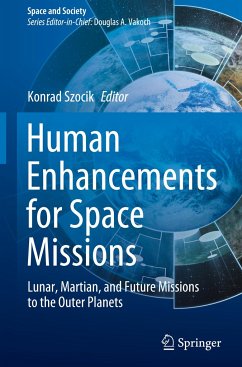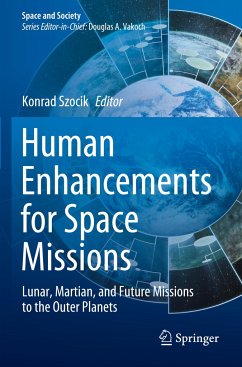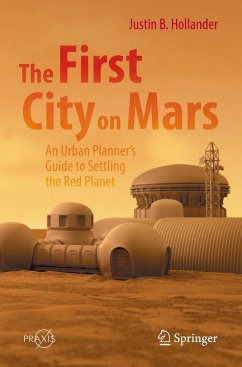
The Human Factor in the Settlement of the Moon
An Interdisciplinary Approach
Herausgegeben: Rappaport, Margaret Boone; Szocik, Konrad

PAYBACK Punkte
53 °P sammeln!
Approaching the settlement of our Moon from a practical perspective, this book is well suited for space program planners. It addresses a variety of human factor topics involved in colonizing Earth's Moon, including: history, philosophy, science, engineering, agriculture, medicine, politics & policy, sociology, and anthropology. Each chapter identifies the complex, interdisciplinary issues of the human factor that arise in the early phases of settlement on the Moon. Besides practical issues, there is some emphasis placed on preserving, protecting, and experiencing the lunar environment across a...
Approaching the settlement of our Moon from a practical perspective, this book is well suited for space program planners. It addresses a variety of human factor topics involved in colonizing Earth's Moon, including: history, philosophy, science, engineering, agriculture, medicine, politics & policy, sociology, and anthropology.
Each chapter identifies the complex, interdisciplinary issues of the human factor that arise in the early phases of settlement on the Moon. Besides practical issues, there is some emphasis placed on preserving, protecting, and experiencing the lunar environment across a broad range of occupations, from scientists to soldiers and engineers to construction workers.
The book identifies utilitarian and visionary factors that shape human lives on the Moon. It offers recommendations for program planners in the government and commercial sectors and serves as a helpful resource for academic researchers. Together, the coauthors ask and attempt to answer: "How will lunar society be different?"
Each chapter identifies the complex, interdisciplinary issues of the human factor that arise in the early phases of settlement on the Moon. Besides practical issues, there is some emphasis placed on preserving, protecting, and experiencing the lunar environment across a broad range of occupations, from scientists to soldiers and engineers to construction workers.
The book identifies utilitarian and visionary factors that shape human lives on the Moon. It offers recommendations for program planners in the government and commercial sectors and serves as a helpful resource for academic researchers. Together, the coauthors ask and attempt to answer: "How will lunar society be different?"














